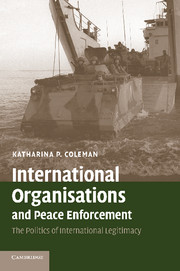Book contents
- Frontmatter
- Contents
- List of maps
- List of figures
- List of tables
- Acknowledgements
- List of abbreviations
- 1 Introduction
- 2 States, international organisations, and legitimacy: a theoretical framework
- 3 Peace enforcement through sub-regional organisations: the Economic Community of West African States and Operation Liberty in Liberia
- 4 Peace enforcement through sub-regional organisations: the Southern African Development Community and Operation Sovereign Legitimacy in the Democratic Republic of Congo
- 5 Peace enforcement through sub-regional organisations: the Southern African Development Community and Operation Boleas in Lesotho
- 6 Peace enforcement through a military alliance: the North Atlantic Treaty Organisation and Operation Allied Force in Kosovo
- 7 Peace enforcement through a global organisation: the United Nations and INTERFET in East Timor
- 8 Conclusion
- Epilogue: UN intervention in Lebanon
- Appendix: Summary of interviews conducted
- Bibliography
- Index
7 - Peace enforcement through a global organisation: the United Nations and INTERFET in East Timor
Published online by Cambridge University Press: 10 November 2010
- Frontmatter
- Contents
- List of maps
- List of figures
- List of tables
- Acknowledgements
- List of abbreviations
- 1 Introduction
- 2 States, international organisations, and legitimacy: a theoretical framework
- 3 Peace enforcement through sub-regional organisations: the Economic Community of West African States and Operation Liberty in Liberia
- 4 Peace enforcement through sub-regional organisations: the Southern African Development Community and Operation Sovereign Legitimacy in the Democratic Republic of Congo
- 5 Peace enforcement through sub-regional organisations: the Southern African Development Community and Operation Boleas in Lesotho
- 6 Peace enforcement through a military alliance: the North Atlantic Treaty Organisation and Operation Allied Force in Kosovo
- 7 Peace enforcement through a global organisation: the United Nations and INTERFET in East Timor
- 8 Conclusion
- Epilogue: UN intervention in Lebanon
- Appendix: Summary of interviews conducted
- Bibliography
- Index
Summary
On 20 September 1999, 1,500 Australian, British, and New Zealand troops landed at the Komoro airfield in Dili, East Timor. They were the first wave of the International Force East Timor (INTERFET), an Australian-led multinational force under a United Nations mandate to restore, and if necessary enforce, peace and security in East Timor. Over the next five months, INTERFET expanded to include over 14,000 troops from twenty-two countries, and successfully ended the violence that had engulfed East Timor after its population voted overwhelmingly for independence from Indonesia in a UN-administered ballot on 30 August 1999. INTERFET's arrival in East Timor marked several watersheds: It signalled the beginning of the end of Indonesia's twenty-four-year rule over East Timor. It paved the way for East Timor's birth as an independent state on 20 May 2002. It began Australia's largest military operation since the Vietnam War, and the first operation in which Australia was the lead state rather than a junior coalition partner. And it marked the first time that the UN authorised a peace enforcement mission by a coalition of the willing led by a middle power rather than a superpower.
This chapter examines why Australia decided to launch and lead INTERFET within the UN framework. It begins by describing the historical background of the East Timor crisis and Australia's involvement in it. It then argues that neither respect for international law nor burden-sharing considerations satisfactorily account for Australia's decision.
- Type
- Chapter
- Information
- International Organisations and Peace EnforcementThe Politics of International Legitimacy, pp. 240 - 277Publisher: Cambridge University PressPrint publication year: 2007

